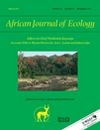
AFRICAN JOURNAL OF ECOLOGY
metrics 2024
Advancing Knowledge in Ecology and Conservation
Introduction
The African Journal of Ecology, published by Wiley, is a leading academic journal in the field of Ecology, Evolution, Behavior, and Systematics. Established in 1963 and continuing its vital contributions to the field until 2024, this journal serves as a premier platform for researchers and scholars to share groundbreaking studies that explore the intricate relationships within ecosystems, particularly in the African context. With an impressive Scopus Rank of #423 out of 721 and a Q3 Quartile ranking, it stands as a credible source of scholarly information, gaining recognition among peers for its rigorous peer-review process and impactful publications. While the journal is not open access, it remains influential in driving advancements in ecological research and providing insights vital for conservation efforts and biodiversity studies. Authors and readers alike will find that the African Journal of Ecology not only promotes scientific inquiry but also fosters a deeper understanding of ecological dynamics that affect our world.
Metrics 2024
 0.39
0.39 1.10
1.10 1.20
1.20 63
63Metrics History
Rank 2024
Scopus
IF (Web Of Science)
JCI (Web Of Science)
Quartile History
Similar Journals

NEW ZEALAND JOURNAL OF ECOLOGY
Championing Ecological Knowledge for a Better TomorrowNEW ZEALAND JOURNAL OF ECOLOGY, published by the New Zealand Ecological Society, stands as a premier platform for disseminating research in the field of ecology, with a notable impact factor reflected in its Q2 ranking in multiple ecology categories for 2023. Established in 1980 and actively publishing since 1982, this journal provides a vital resource for ecologists and environmental scientists, fostering the exchange of innovative ideas and methodologies. The journal covers a wide range of ecological topics, ensuring a comprehensive overview of the current trends and research developments in both ecological theory and practical applications specific to New Zealand and beyond. Researchers, professionals, and students will find in this journal an authoritative source to advance their understanding of ecological dynamics and contribute to the growing field of ecological science. The journal is accessible to the community without open access, providing critical insights that underpin the ecological landscape of New Zealand and inform sustainable practices worldwide.
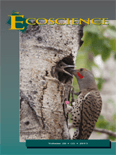
ECOSCIENCE
Connecting researchers to shape the future of our environment.ECOSCIENCE, published by Taylor & Francis Inc, stands as a prominent journal in the fields of Ecology and Environmental Science, recognized for its commitment to advancing knowledge since its inception in 1994. With an ISSN of 1195-6860 and an E-ISSN of 2376-7626, the journal caters to a diverse audience of researchers, professionals, and students passionate about ecological and environmental issues. In 2023, it achieved Q2 and Q3 rankings in the Scopus category of Ecology and Evolution, Behavior and Systematics, reflecting its significance within the academic community. Moreover, ECOSCIENCE occupies notable positions in Scopus rankings, including Rank #324 in Agricultural and Biological Sciences and Rank #210 in Environmental Science, symbolizing its role as a catalyst for disseminating high-quality research. Although currently not open access, the journal's multifaceted scope encourages in-depth discussions on ecological diversity, conservation strategies, and sustainable practices, making it an invaluable resource for those engaged in ecological research and practice.
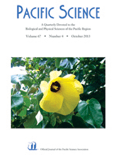
PACIFIC SCIENCE
Advancing Multidisciplinary Insights from the PacificPACIFIC SCIENCE is a prestigious multidisciplinary journal published by University of Hawaii Press, dedicated to advancing knowledge across diverse fields of study related to the Pacific region. With a robust ISSN of 0030-8870 and an E-ISSN of 1534-6188, this journal serves as a vital platform for researchers, professionals, and students to disseminate and access influential research findings that contribute to the understanding of ecological, cultural, and social dynamics in the Pacific. The journal has steadily maintained its relevance since its inception in 1947 and features a commendable Scopus Rank of #74 out of 171 in the multidisciplinarity category, placing it in the 57th percentile of its field, and is recognized as having a Q2 quartile ranking in 2023. Although lacking open access options, PACIFIC SCIENCE offers in-depth analysis and scholarly discourse, effectively bridging various disciplines to foster collaboration and innovation. With its commitment to high-quality research and its significant impact on Pacific studies, the journal continues to play an important role in informing policy, conservation efforts, and community engagement within this vital region.
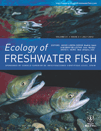
ECOLOGY OF FRESHWATER FISH
Illuminating the science of aquatic life.ECOLOGY OF FRESHWATER FISH is a premier academic journal dedicated to advancing the understanding of freshwater fish ecology, published by Wiley in Denmark. With an ISSN of 0906-6691 and an E-ISSN of 1600-0633, the journal has been a critical platform for researchers since its inception in 1992, and will continue through 2024. It holds an impressive Q2 ranking in multiple categories including Aquatic Science and Ecology according to the latest quartiles, reflecting its significance and impact in these fields. The journal is well-regarded with Scopus rankings placing it in the top percentiles for ecology-related disciplines, showcasing its contributions to the understanding of aquatic ecosystems. Although it does not offer open access, the journal is highly valued for its rigorous peer-review process and its commitment to publishing original research that informs policy and conservation efforts. By bridging the gap between theory and practice, ECOLOGY OF FRESHWATER FISH remains a vital resource for students, professionals, and researchers engaged in the study of freshwater environments.

INTERNATIONAL REVIEW OF HYDROBIOLOGY
Unlocking the Secrets of Aquatic Life and BehaviorINTERNATIONAL REVIEW OF HYDROBIOLOGY is a prestigious academic journal dedicated to the dynamic fields of Aquatic Science and Ecology, Evolution, Behavior, and Systematics. Published by a reputable German publisher, this open-access journal ensures that groundbreaking research is readily available to a global audience, fostering collaboration and innovation within the scientific community. With an impressive impact factor and classification within the Q2 category of both Aquatic Science and Ecology, it ranks notably high on Scopus, standing at 211 out of 721 in Ecology and 84 out of 247 in Aquatic Science as of 2023. Covering a broad scope from fundamental hydrobiological research to applied ecological studies, the journal plays a crucial role in advancing knowledge and addressing contemporary environmental challenges. Researchers, professionals, and students will find INTERNATIONAL REVIEW OF HYDROBIOLOGY to be an essential resource for informing their own work and contributing to the global dialogue on aquatic systems and their conservation.
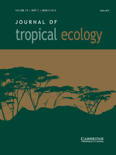
JOURNAL OF TROPICAL ECOLOGY
Advancing Knowledge for a Sustainable FutureThe JOURNAL OF TROPICAL ECOLOGY, published by Cambridge University Press, serves as a pivotal platform for advancing knowledge in the field of ecology, particularly within tropical environments. With an ISSN of 0266-4674 and an E-ISSN of 1469-7831, this esteemed journal has been a key resource since its inception in 1985, maintaining a focus on empirical research that addresses the complexities of tropical ecosystems. It holds a respectable Q3 ranking in the Ecology, Evolution, Behavior and Systematics category as of 2023, indicating its significant contribution to the field, although it remains within the competitive mid-range. The journal publishes original research, reviews, and methodological articles that illuminate the rich biodiversity and unique ecological processes of tropical regions, fostering a deeper understanding of conservation challenges. Accessible from the United Kingdom, this publication appeals to a diverse audience of researchers, professionals, and students keen on exploring ecological dynamics in tropical settings, and plays a crucial role in promoting scientific discourse and collaborative efforts aimed at preserving our planet's vital ecosystems.

WETLANDS ECOLOGY AND MANAGEMENT
Exploring the intricate balance of wetland ecosystems.Wetlands Ecology and Management, published by Springer, is an esteemed journal that has been advancing the field of wetland studies since its inception in 1982. Operating under the ISSN 0923-4861 and E-ISSN 1572-9834, this journal is headquartered in the Netherlands and serves as a critical resource for researchers, professionals, and students alike. It fosters interdisciplinary dialogue among aquatic science, ecology, and resource management disciplines, ranking in the Q2 category for Aquatic Science and Ecology, Evolution, Behavior and Systematics as of 2023. With a notable Scopus ranking, it is positioned favorably within the 65th percentile in Ecology and a commendable 58th percentile in Aquatic Sciences. The journal emphasizes the importance of effective management strategies and policies in the conservation of wetlands, making it indispensable for those aiming to drive impactful research. Although it is not an open-access journal, its high-quality publications remain accessible through library consortia and institutional subscriptions, ensuring that pertinent insights into the ecological dynamics and sustainable management practices are available to the global research community.
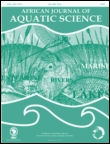
AFRICAN JOURNAL OF AQUATIC SCIENCE
Innovating solutions for freshwater and marine challenges.AFRICAN JOURNAL OF AQUATIC SCIENCE, published by TAYLOR & FRANCIS LTD, is a premier scholarly journal dedicated to the field of aquatic science, ecology, and environmental management, playing a crucial role in advancing research and knowledge in these vital areas. With an impressive Q2 ranking in both Aquatic Science and Ecology, Evolution, Behavior and Systematics, the journal seeks to publish high-quality research encompassing a wide range of topics related to freshwater and marine ecosystems, including biodiversity, conservation strategies, and the impacts of climate change. Featuring a rich history of publication from 2000 to 2024, the journal not only embraces rigorous peer review but also aims to foster collaboration and dialogue among researchers, practitioners, and students interested in aquatic environments. Readers will find that the journal’s commitment to impactful scientific communication is reflected in its notable rankings within the Scopus database, making it an essential resource for those engaged in aquatic research and management.
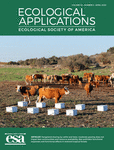
ECOLOGICAL APPLICATIONS
Innovative insights driving ecological management.ECOLOGICAL APPLICATIONS, published by WILEY, is a leading journal in the field of ecology, providing a platform for innovative research that addresses the understanding and management of ecological systems. With an ISSN of 1051-0761 and E-ISSN of 1939-5582, it has established itself as a vital resource for ecologists and environmental scientists since its inception in 1991. Ranked in the top quartile (Q1) for Ecology in 2023 and with a Scopus ranking of 40 out of 461 in Environmental Science, ECOLOGICAL APPLICATIONS boasts an impressive impact factor, attesting to its significance and influence in the field. The journal's mission is to publish peer-reviewed articles that contribute to ecological theory and its applications in conservation and environmental management. Researchers, professionals, and students alike will find invaluable insights and the latest developments in ecological research through its comprehensive scope and rigorous scholarship, ensuring a crucial role in shaping future ecological practices and policies.
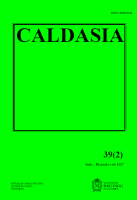
CALDASIA
Bridging Research and Innovation in Biological SciencesCALDASIA is a distinguished open-access journal dedicated to the field of Agricultural and Biological Sciences, published by INST CIENCIAS NATURALES, MUSEO HISTORIA NATURAL since its inception in 1981. Based in Colombia, this journal plays a pivotal role in disseminating scientific knowledge and fostering research collaboration across the globe. With a focus on diverse subjects within the biological sciences, CALDASIA aims to bridge gaps in research and support scholars, professionals, and students in advancing their work. With a 2023 Scopus Ranking of #132 out of 221 in its category, representing a 40th percentile ranking, it holds a solid position in the academic community, particularly recognized for its contributions to miscellaneous areas within agricultural and biological sciences. The journal remains committed to enhancing accessibility, as evidenced by its open-access policy since 2001, thereby ensuring that research findings reach a wider audience without barriers. For those returning to this vibrant field, CALDASIA serves as an essential resource for contemporary findings and discussions that shape environmental and biological scholarship.